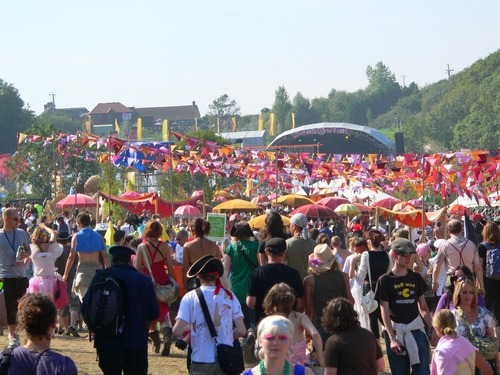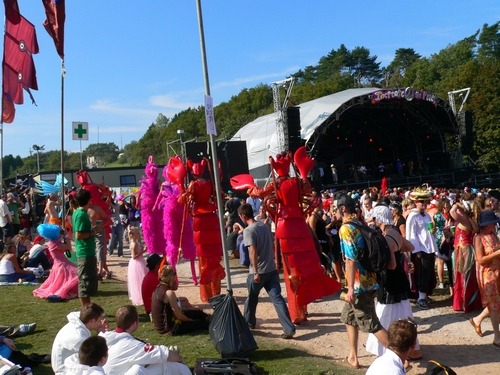
Camp Bestival 2008
Friday 18th to Sunday 20th July 2008Lulworth Castle, Dorset, BH20 5QS, England MAP
SOLD OUT
Rob Da Bank's interest in festivals started when he was a teenager, ever since then he has been a regular attendee at Reading and Glastonbury, back when they were the main fare for festival goers.
Today he's the organiser of Bestival and the new show Camp Bestival, billed as a completely different type of festival, and launched in a turbulent year for festivals, he's excited about both festivals. He's hoping to attract hardened festival goers as well as new people who wouldn't normally go to festivals, to this weekend's new event in Dorset.
Rob has also launched the Association of Independent Festivals, I asked him what the motivation for starting the AIF was. "When I started Bestival we were losing money on daft things, and we didn't know what we were doing, and at the time we were thinking there should be someone to help us out on things like that, and there wasn't. So, we thought let's start something ourselves." Although actually there was the long running Association of Festival Organisers, but Rob felt that was primarily aimed at the folk scene.
The Association of Independent Festivals has been set up as a non-profit trade organisation created to represent UK music festivals including Womad, Creamfields, Summer Sundae Weekender, Bestival, Electric Picnic, and Big Chill. Also involved are the organisers of Beautiful Days, Bloom, Glade, The Secret Garden Party, and Field Day.
Rob added that the idea was really well received, and that a lot of the festival promoters even from the first board meeting felt it was providing something very useful. I asked what the aims of the AIF were, Rob replied, "Sharing knowledge, improving the quality of all the events, we're talking about smallish independent festivals."
Rob feels that the AIF could have aided some of the recent festivals which have collapsed, "For instance Wild In The Country, and three or four other events have just gone down, if something like AIF had been set up then these people could have been helped out, we have a lot of common ground between all us independent festival organisers, whether that's by reducing costs, or sharing knowledge on crime, theft and stuff like that."
I asked Rob how festival organisers go about joining the AIF, he replied, "Just email us, we've already had 20 or 30 more wanting to join since we launched, and everyone who has emailed has had the qualities to join. I think it's going to grow really quickly. It's a completely inclusive organisation it's not there to exclude anyone or to be an elite, it's there for everyone in the UK who is running an independent festival to get in there." Although Rob did concede that the independent Glastonbury Festival would not be included, he couldn't see them applying but if they did, the board would have to consider it although the organisation was primarily aimed at much smaller independent festivals. Rob went on to say that there's 400 UK festivals around this year and he felt 90% of those would be able to join if they wanted.
"We have found it very difficult to decide what the definition of an independent festival, each festival is independently looked at. It's not a case of 'oh no, we don't want them a part of it'. If I'd set it up for all festivals then it would be the more the merrier. The point is that it's for people, who are not struggling, but need help. Ultimately, the bigger festivals owned by the corporations, don't need that help. The AIF is set up to help people, not make them more money."
I enquired about the merits of joining AIF, would new festivals be able to join the board right away. Rob explained, "The board is a fixed board of 15 people which after a couple of years starts to be voted on and off exactly like AIM does. We follow the lead of AIM of how they run their business."
So would this mean that a new festival joining would not have any power within the organisation. "To be honest there's no power behind the board, other than looking at the qualities of the new festival members wanting to join. There's no advantage of being on the board as such, the thing has been set up in a democratic way, exactly the same as AIM, people can see that model works."
AIM is the Association of Independent Musicians established in 1998 by UK independent record labels to represent the independent record sector. With over 800 members, from the smallest start-ups to the largest and most respected independents in the world, it is effectively a fifth major label in the industry. It helps young musicians and musical groups organize performances, as well as providing technical assistance, resources, contacts, practical advice, and new opportunities for independent record labels.
So what were the main benefits for a festival organiser joining the AIF, I asked. Rob replied, "A share of knowledge, a database of known festival criminals, cost reductions on stages, lighting, security, and people to deals on product. When I started it I never thought about saving costs - essentially it's to be part of this sort of club of people that are in festivals for the love and not the money. They want to give their customers a better experience and survive in this tumultuous climate and talk to other festival organisers and share information, and knowledge."
I asked Rob about the conflict of interest with independent festivals and the presence of people who work for the corporates also involved in the form of Lovebox Dublin who have links with MCD, and Rock Ness which has sold to AEG.
Rob replied that, "Lovebox isn't part of AIM, John Reynolds (Pod Concerts) is Electric Picnic and isn't part of Lovebox Dublin anymore." and that, "Jim King is on there as Loud Sound not as Rock Ness, he's the technical advisor to the IAF in terms of staging and lights and that sort of stuff."
Later in the interview Rob returned to this point, explaining that those involved with corporate organisations were still able to join as long as they ran an independent festival adding, "AIF offers no financial support to festivals, it's not a commercial type venture, it's set up to promote good independent festivals, and get standards up, and keep some costs down, but on the whole angle of AEG, and Live Nation, if anyone has individual interests with them that's up to them, but if they sell their festival to them then they have to leave AIF. Most members are more interested in keeping ticket sales going in a competitive market in a funny year for festivals, rather than what the big boys are doing." So it would seem that members of the organisation can have links to the corporates, on an individual basis. This slightly concerned me, that those individuals could then use the AIF as an easy way to make offers on independents, Rob however re-iterated that this possibility wouldn't arise.
Rob made it clear that if members of the AIF were to sell stakes of their festivals to the corporates like AEG, MCD or Live Nation then they would have to step down from the AIF. I asked what if festival organisers had more than one interest, running more than one festival, where one of their events was 'in league' with the corporates.
He seemed slightly miffed by the question,"Then that festival wouldn't be part of AIF. Everyone joining knows that, and everyone's who is part of one of those organisations know that, we've talked very openly to all these people already, and everyone's aware of why it's set up, and who can join and who can't. It's a minority of people that can't be part of it, and I don't think there's any point in them being part of it because it's completely irrelevant to most of them, they don't care about saving £20,000 on the security bill, they've been in it long enough that they know what they are doing."
I asked if the AIF was set up to protect the smaller festival organisers from the corporates, "No, not really, most of the festivals on the board have nothing in common with the corporate festivals, and so ultimately it doesn't effect them." I have to disagree with Rob here, my concern is that since the corporates have made in roads into the UK festival market, they won't stop with the big festivals, but continue to monopolise the market by buying up mid-size festivals.
Wondering if this scenario was possible, I asked if the AIF was an attempt to create a barrier 'circling the wagons' for independent festivals against the onslaught of corporates who are trying to buy into the festival scene in the UK? "No, no, it was me that came up with the idea and got it off the ground, at board meetings we've talked about Live Nation and AEG trying to buy into festivals, but not in terms of competition. Most of us don't have any problems, as we're not the sort of festivals that compete against those big act festivals."
I wanted to know if the AIF would try to prevent exclusivity deals with acts in an attempt to stop the corporates from buying up the market, "I don't think that's what we're trying, because that's anti the whole independent spirit of what we're trying to do. Every year there's a handful acts that there are exclusivity deals, but they are totally different fish to the sort of acts that we want to book." He added that most of the festivals like Green Man or glade just wouldn't be interested in these acts anyway.
Rob hopes the big boys will still do well, because festival organisers need that balanced market, the huge shows, the medium shows like his, and the tiny ones. It makes for one of the best festival markets in the world, he feels in terms of the variety on offer.
"Last year I thought we reached saturation point for festivals, some people didn't think that and started new festivals up and others kept up festivals that had already done badly the year before. This year already there are already four or five medium sized festivals which have gone down they won't be back." He thinks the number of people going to festivals hasn't increased, there's just more festivals around. It's a cycle where only the strongest survive. The festivals Rob sees doing well are the 500-5000 capacity small festivals run on tiny budgets for the fun of it will prosper as more festival goers want the small intimate experience.
I asked him if the AIF would result in all the festivals under their umbrella becoming less diverse, if they all share the same infrastructure and would offer less variety. Rob was clear that where festivals have found their niche, they have their own vibrant scenes, and these appeal on different levels to their audiences, and it is these aspects which make them unique.

interview by: Scott Williams
Latest Updates
 Camp Bestival Dorset 2025
Camp Bestival Dorset 2025festival details
last updated: Fri 18th Oct 2024
 Camp Bestival Shropshire 2024
Camp Bestival Shropshire 2024festival details
last updated: Tue 16th Jul 2024
 Camp Bestival Shropshire 2024
Camp Bestival Shropshire 2024line-ups & rumours
last updated: Tue 16th Jul 2024
 Camp Bestival Dorset 2024
Camp Bestival Dorset 2024festival details
last updated: Mon 1st Jul 2024
 Camp Bestival Dorset 2024
Camp Bestival Dorset 2024line-ups & rumours
last updated: Mon 1st Jul 2024





